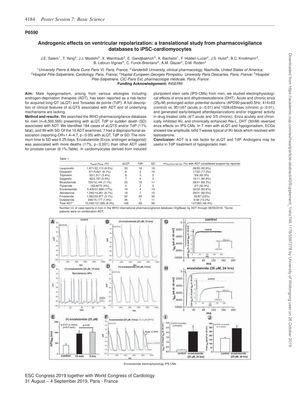Androgenic Effects on Ventricular Repolarization: A Translational Study from Pharmacovigilance Databases to iPSC-Cardiomyocytes
October 2019
in “
European heart journal
”
androgen-deprivation therapies acquired long-QT syndrome Torsades de Pointes sudden death enzalutamide androgen antagonist dihydrotestosterone induced pluripotent stem cells cardiomyocytes early afterdepolarizations delayed afterdepolarizations triggered activity IKr block testosterone hypogonadism ADT aLQT TdP SD DHT IPS-CMs ECGs

TLDR Androgen-deprivation therapies increase the risk of certain heart conditions, but testosterone treatment may help.
The study investigated the association between androgen-deprivation therapies (ADT) and the risk of acquired long-QT syndrome (aLQT), Torsades de Pointes (TdP), and sudden death (SD) in men. Analyzing data from the WHO pharmacovigilance database, which included 6,560,565 men, researchers found 184 cases of aLQT and/or TdP (11% fatal) and 99 cases of SD associated with ADT. Seven out of ten ADTs examined showed a significant association with these conditions. Enzalutamide, an androgen antagonist, was linked to a higher percentage of deaths (17%) compared to other ADTs. In vitro studies using cardiomyocytes derived from induced pluripotent stem cells (IPS-CMs) from men showed that enzalutamide prolonged action potential durations and caused early/delayed afterdepolarizations and/or triggered activity, effects that were reversed by dihydrotestosterone (DHT). In seven men with aLQT and hypogonadism, ECGs indicated low amplitude, bifid T-waves typical of IKr block, which resolved with testosterone treatment. The study concluded that ADT is a risk factor for aLQT and TdP, and androgens may be beneficial in treating TdP in hypogonadic men.




